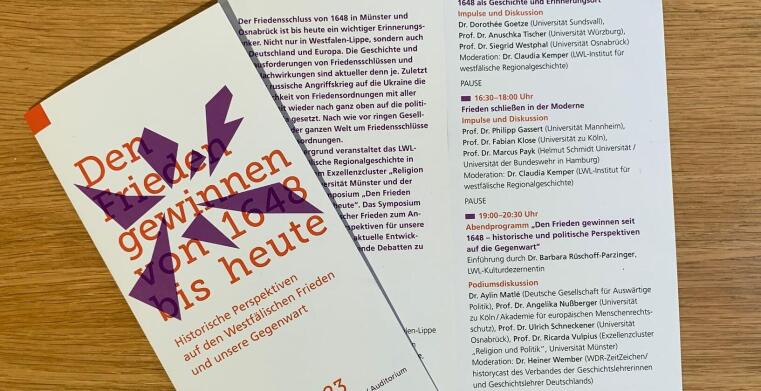
Symposium: “Winning the peace from 1648 to today”
From the Peace of Westphalia 375 years ago to the current situation in Israel/Gaza and Ukraine
Scholars at the Münster symposium “Winning the peace from 1648 to today” discussed the lessons that can be learned from past peace treaties. As announced by historians Dr. Claudia Kemper from the Landschaftsverband Westfalen-Lippe (LWL) and Prof. Dr. Ricarda Vulpius from the Cluster of Excellence “Religion and Politics” at the University of Münster, the event also addressed the international security situation and challenges for future peace, particularly in light of the situation in Ukraine and Israel/Gaza.
The symposium “Winning the peace from 1648 to today” was organized in the anniversary year “375 Years of the Peace of Westphalia” by the LWL Institute for Westphalian Regional History, the Cluster of Excellence, and the City of Münster.
“The peace treaty of 1648 is still an anchor of remembrance today”, according to Claudia Kemper. “The challenges of peace treaties are more relevant than ever. Societies around the world are still struggling for peace treaties and post-war systems”. Eastern European historian Ricarda Vulpius added: “Peace negotiations begin with the fundamental acceptance of the negotiating partner. As long as the Russian government does not show this acceptance to the Ukrainian side, there is not even the minimum condition for any form of peace treaty to end the war”.
Can the Peace of Westphalia be a model for Ukraine?
According to Ricarda Vulpius in an interview about the symposium (October 2023), the Peace of Westphalia, in creating a lasting new security order, can be a model for the settlement of today’s wars. We can learn from 1648 that the condition for the start of negotiations is a military stalemate. “At that time, neither of the warring parties saw any chance of gaining significant ground. Added to this was war fatigue”. However, no military stalemate has yet materialized in the Russian-Ukrainian war. “Moreover, the Russian side has not sent out any signal that it is interested in negotiations in search of a just peace. That is the biggest difference to the Peace of Westphalia”.

Taking place at the LWL Museum of Art and Culture, the event was subtitled “Historical perspectives on the Peace of Westphalia and the present day”. It began with two panels that saw historians discuss “1648 as history and place of remembrance” and “Making peace in the modern age”. This was followed in the evening by the panel “Winning the peace since 1648 – historical and political perspectives on the present”.
Moderated by radio journalist Dr. Heiner Wember, the evening panel discussion featured historian Prof. Dr. Ricarda Vulpius, legal scholar Prof. Dr. Angelika Nußberger from the Academy for European Human Rights Protection, Dr. Aylin Matlé from the German Council on Foreign Relations, and Osnabrück social scientist Prof. Dr. Ulrich Schneckener. LWL Head of Cultural Affairs, Dr. Barbara Rüschoff-Parzinger, gave an introduction in the evening, and LWL director Dr. Georg Lunemann, Mayor Angela Stähler, and Prorector Prof. Dr. Michael Quante spoke at the beginning of the symposium.

